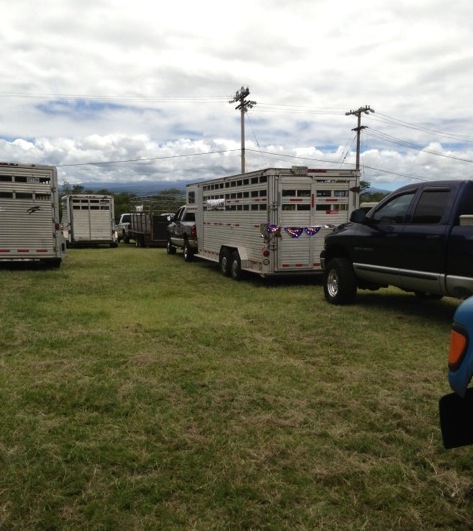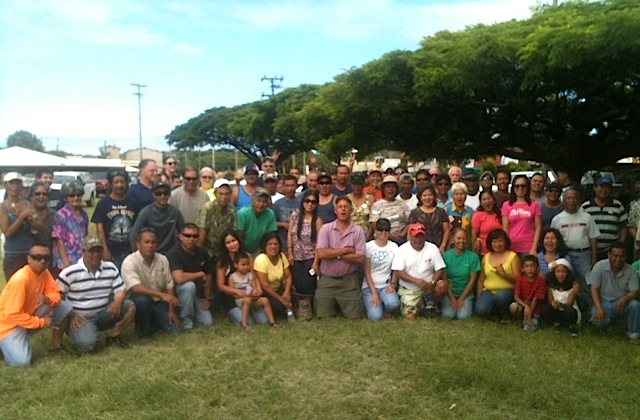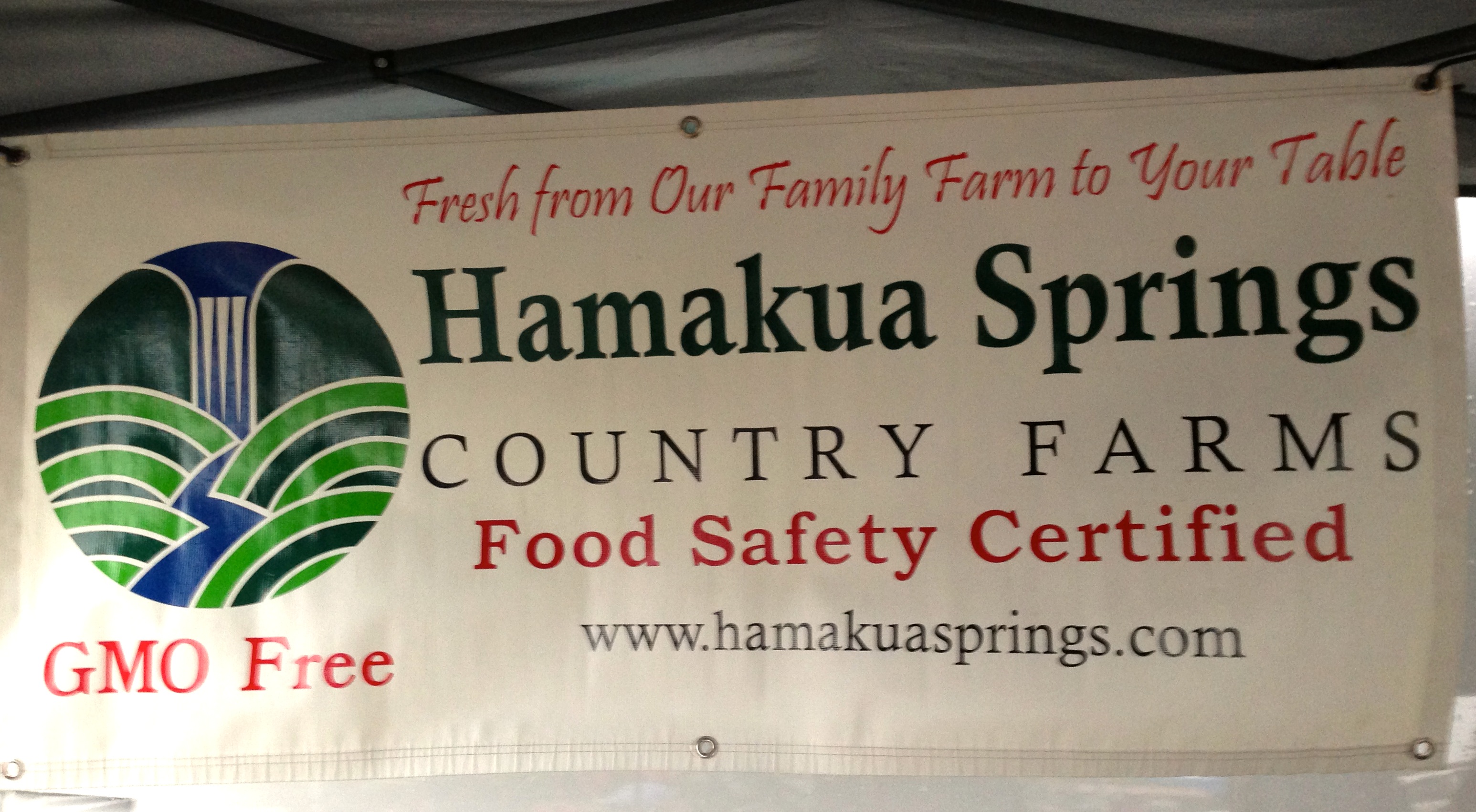By Leslie Lang, blog editor
Thursday was such an interesting day. Arianna Huffington of the Huffington Post, and Pierre Omidyar, founder of Honolulu’s online newspaper Civil Beat (and founder of eBay), spent some time at Hamakua Springs Country Farms.
The background is that Huffington Post and Civil Beat have teamed up to start HuffPost Hawaii (and they asked Richard to blog for the new online news organization. Here’s his first HuffPost Hawaii post, by the way.)
So this week, Arianna and Pierre were making the rounds in Hawai‘i for the big HuffPost Hawaii launch. They spent Thursday on the Big Island, where they were welcomed with a big reception at ‘Imiloa Astronomy Center.
The only other Big Island stop they made was to Richard’s farm. They had asked if they could come and meet Richard and learn about what he’s doing. So that happened Thursday afternoon, and Richard invited me to join them there.
What a completely fascinating day. There’s something about being around really smart people who are doing big and really interesting things, making things happen and making a difference. Richard is completely like that, too, as you know if you’ve been reading this blog. It’s invigorating to be around that kind of energy.
Both Arianna and Pierre are very friendly and down-to-earth, and both are interested in issues of sustainability and what Richard is doing.
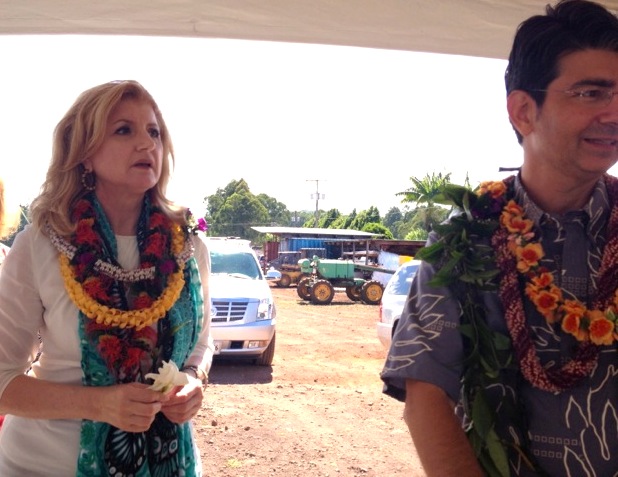
Richard told them about his background — flunking out of college the first time around and ending up in Vietnam, coming back and trading manure from his father’s chicken farm for bananas to start what eventually became Hamakua Springs Country Farms — about seeing prices start rising, rising, rising and wondering why; about attending five Peak Oil conferences and starting to learn what was happening. He talked about how he forces the changes needed to get to where he needs to be five or 10 years in the future.
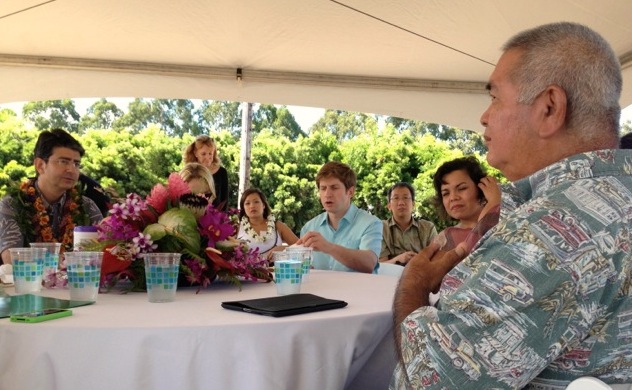
He talked about the current threat to Big Island farming from anti-GMO bills, and Pierre asked some very salient (and polite) questions about some common GMO fears, such as of:
- Commercial control of seeds. Richard replied that in many cases, such as with, for instance, the Rainbow papaya, virus-resistant seeds are developed by the university and not controlled by any big business at all. This, he said, is often the case.
- Cross-pollination, or “pollen drift.” Richard responded that due to numerous studies, we know how much drift there is for different crops. Farmers work together, he says, to plan what is planted where, plant so many lines of “guard rows” and it’s completely manageable.
They asked about Richard’s new hydroelectric system, and we took a dusty, bumpy country road drive out to see where the water runs through an old sugar cane flume, and then through a turbine.
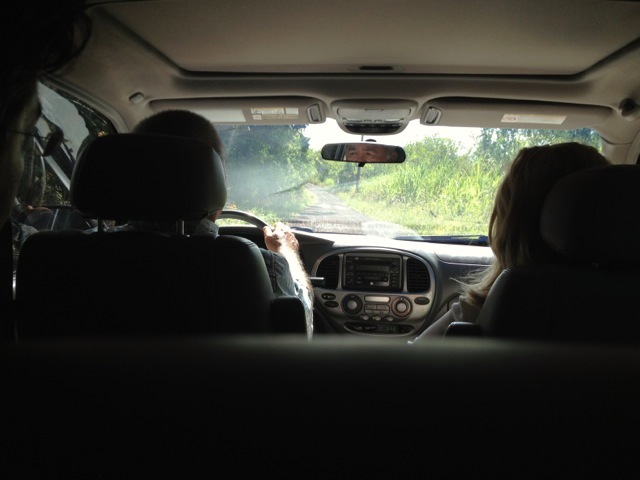
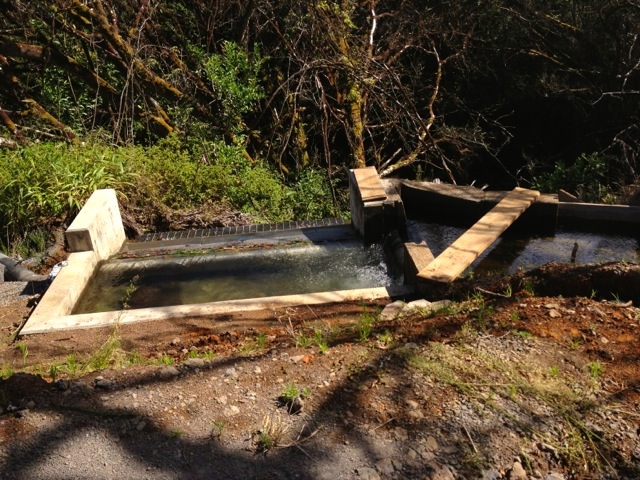
Arianna and Pierre were very interested in this, and in how, when the switch is thrown very shortly, the farm will be saving perhaps almost half of its monthly electric bill, which now averages $10-11,000.
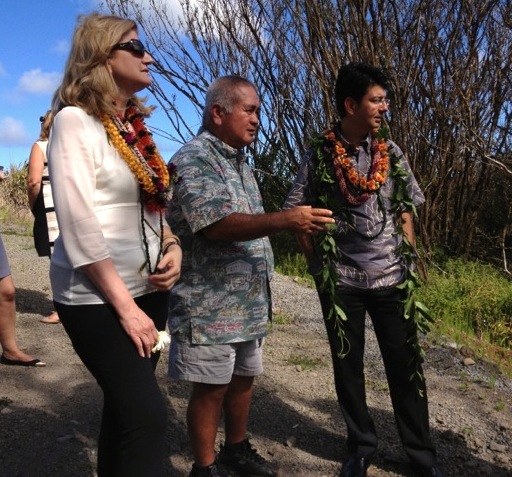
Pierre asked about returning excess power to the utility, and was shocked to learn that due to a technicality, Richard will not be paid for the power he feeds to HELCO. Pierre kept returning to that and said, more than once, “That’s just not right.” Richard finally replied, “Well, at least it’s not wasted.”
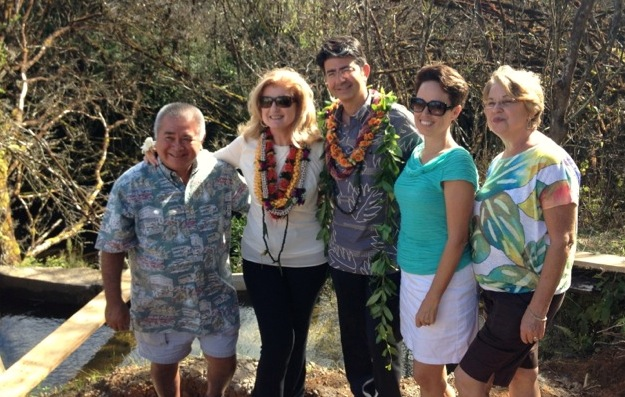
Richard Ha, Arianna Huffington, Pierre Omidyar, Leslie Lang, June Ha
Richard talked about how they have converted the farm from growing mostly bananas to being a family of farms, which brings in local farmers who then have a close-to-home place to farm. This, in turn, means the farm produces a more diverse crop.
He told Arianna and Pierre about growing their current experiment growing tilapia, to learn how to add a protein component to the food they produce and also use the waste as fertilizer. Workers can fish for tilapia there and take some home for their families.
Arianna and Pierre both seemed sincerely interested. They paid close attention and asked good questions.
Richard told them about talking with Kumu Lehua Veincent, who was principal of Keaukaha Elementary School back in the early days of the Thirty Meter Telescope (TMT) push. He told them that he asked Kumu Lehua, “What if we ask the TMT for five, full-ride scholarships to the best schools in the nation for your best students?” He told them that Kumu Lehua thought about it for a minute and then quietly asked, “And what about the rest?”
This was a turning point, explained Richard, who said that at the time he could feel his ears turning red. He told Arianna and Pierre that that phrase, What about the rest? gives him an “unfailing moral compass.”
It always brings him back to the rubbah slippah folk, he told them. The “rubbah slippah” folk are in contrast to the “shiny shoes” folk. When he explained this, Pierre looked down at his own shoes.
“I wore my shiny shoes today,” he said, “but I meant to change into my sneakers before coming to the farm.” He mentioned his shiny shoes a couple more times during the visit.
“I felt they absolutely got what I meant when I advocated for the ‘rubbah slippah’ folks,” Richard told me, “and completely support that idea.”
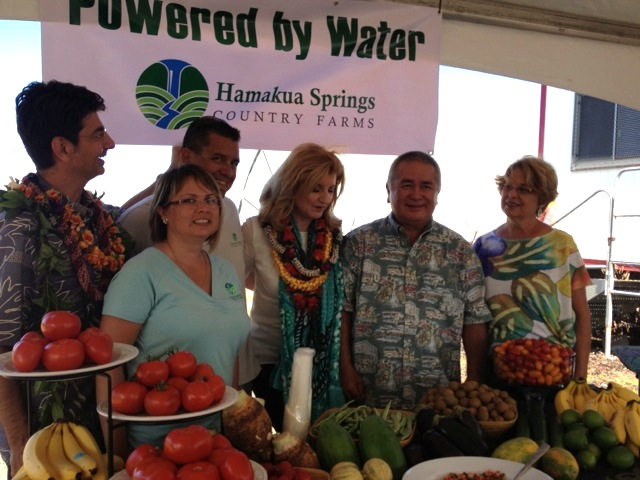
Richard’s daughter Tracy had laid out a beautiful spread of Hamakua Springs produce back by the office, where there was a tent set up, and Arianna zeroed in on the longan.
“What’s this?” she said, and Tracy explained that it’s a delicious fruit. She handed one to Arianna, along with some wipes (they are juicy and messy), and Arianna loved it.
Arianna gives the impression of being very family-oriented. “At what point did you and June get married in this long process?” she asked, when Richard was explaining how he got started farming 35 years ago. (The answer: 32 years ago, and when June joined the family she took all the farm receipts out of a big banana box and straightened out the accounting.) Arianna asked Tracy if she had siblings. When she was introduced to Richard’s grandson Kapono, she looked at him, and at his parents, and asked, “Now, are you Tracy and Kimo’s son?” (Yes.)
She gave June a copy of her book, On Becoming Fearless.
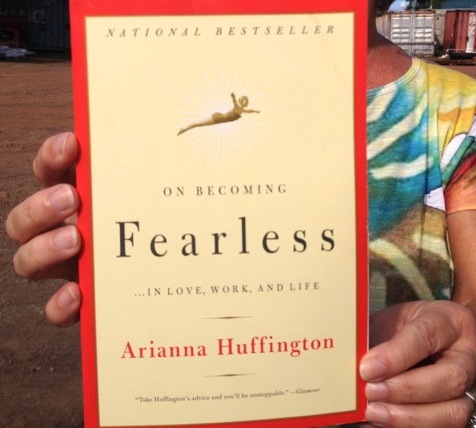
Both Arianna and Pierre are such interesting people. One of the things Richard talks about is forcing change, and that is something that both his guests are all about, too: Looking down the road and fixing things, forcing the change instead of letting things bumble along.
It is refreshing to be in the presence of such interesting thinkers and doers. Great day.
This is a video Civil Beat did with Richard recently, before Arianna and Pierre’s visit. It’s really nicely done and you get to hear a bit about some of the topics they discussed yesterday (while seeing gorgeous views of the farm).









